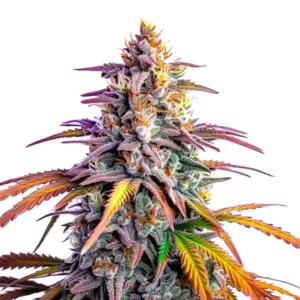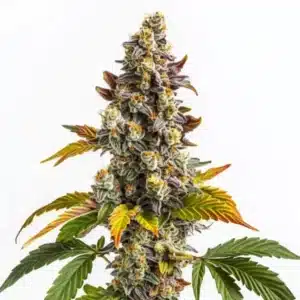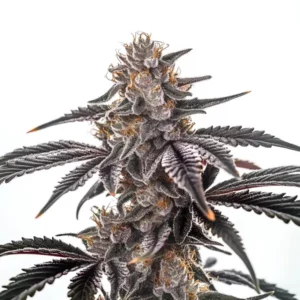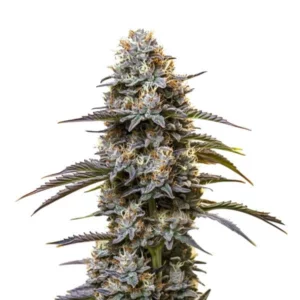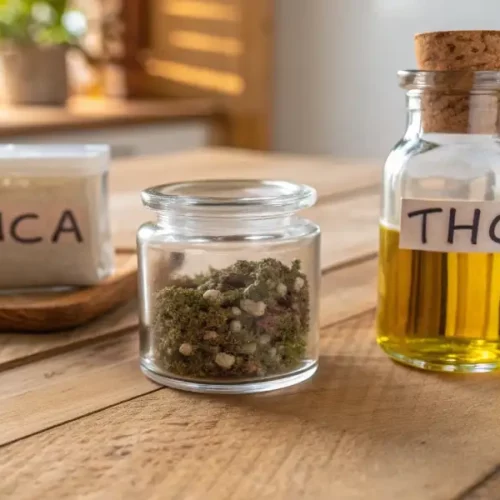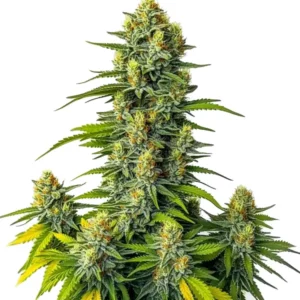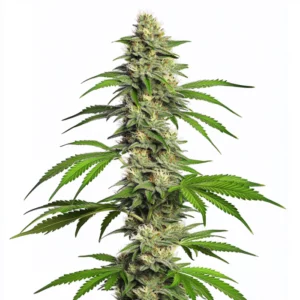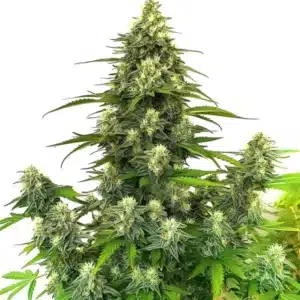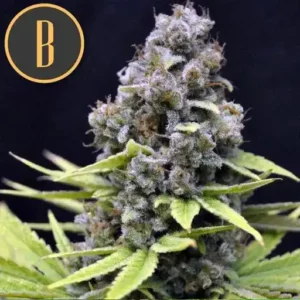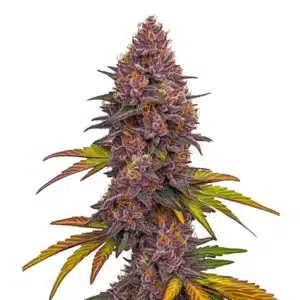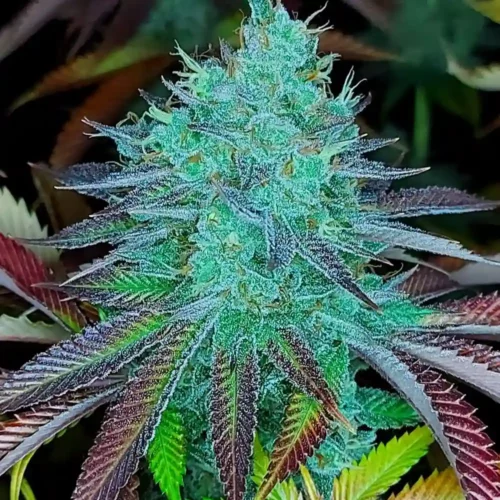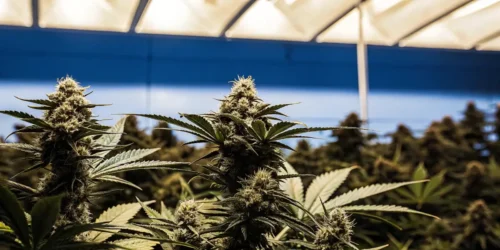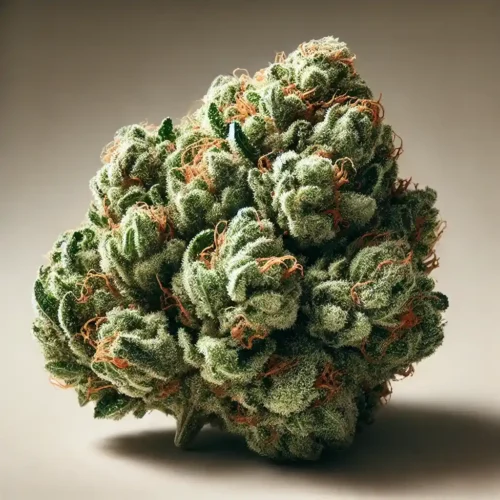Lemon Skunk Autoflower Description
Lemon Skunk Auto or Lemon Skunk Autoflower is a sativa-dominant cannabis strain, renowned for its uplifting and creative effects. This strain is a cross between Lemon Skunk and Ruderalis, delivering the best of both worlds. Lemon Skunk Auto is appreciated by both beginners and seasoned cultivators due to its easy-to-grow nature and relatively short flowering period of 8 to 10 weeks.
The strain’s high THC levels, ranging from 18% to 24%, make it a potent choice for those seeking strong effects. It has a refreshing citrusy aroma, with dominant lemon flavors complemented by earthy undertones. The buds of Lemon Skunk Auto are typically medium-sized, dense, and coated with trichomes, making them highly appealing both visually and in terms of potency.
Recommended Strains
Lemon Skunk Autoflower
 THC: 18% - 24%
THC: 18% - 24% Type of seed: Autoflowering
Type of seed: Autoflowering Phenotype: Mostly Sativa
Phenotype: Mostly Sativa Day to flower: 7 - 8 weeks
Day to flower: 7 - 8 weeks
Not only is Lemon Skunk Auto praised for its recreational benefits, but it’s also favored in medicinal cannabis communities. Its energizing effects can help manage conditions like arthritis, insomnia, and pain. Overall, Lemon Skunk Autoflower is a strain that delivers strong results while being easy to cultivate, offering a rewarding experience for growers of all levels.
Promos & Deals
Environmental Requirements for Growing Lemon Skunk Autoflower
Lemon Skunk Autoflower thrives in various growing environments, whether indoors or outdoors. For optimal growth, it prefers a mild, temperate climate. Indoor growers should maintain temperatures between 70°F to 80°F (21°C to 27°C) during the day and allow slight drops at night to mimic natural conditions.
One of the most important factors when growing Lemon Skunk Auto is providing consistent lighting. A high-quality LED grow light or HPS lamps with a full spectrum are essential for promoting photosynthesis and encouraging robust bud development. During the vegetative stage, a light schedule of 18-20 hours per day works best, while a switch to 12 hours of light and 12 hours of darkness will trigger the flowering phase.
For outdoor growers, Lemon Skunk Autoflower flourishes in a sunny environment. It’s capable of growing in all seasons, provided the temperatures are stable. Those in cooler climates may benefit from using greenhouses or protective coverings to extend the growing season. Its sativa-dominant genetics allow it to reach a height of up to 4.92 ft (1.5 m), so make sure you have enough vertical space if growing indoors.
Setting Up The Growing Cannabis Space
Indoor Cannabis Cultivation
For indoor growing, it’s crucial to create an optimized space for Lemon Skunk Autoflower. Use a grow tent or a dedicated room that allows for ventilation and light management. Lemon Skunk Auto does best in an environment where the airflow is regulated, as it prevents issues like mold and mildew from forming. Installing a carbon filter system is advisable to control odors, especially during the flowering stage.
The choice of a growing medium is also important. Lemon Skunk Auto grows well in soil rich in organic matter, but hydroponic setups can yield great results as well. Ensure that the pH level is maintained between 6.0 and 6.5 for the best nutrient uptake. Watering should be moderate, avoiding over-saturation, as autoflowers generally prefer less frequent watering compared to photoperiod strains.
Outdoor Cannabis Cultivation
When growing Lemon Skunk Autoflower outdoors, selecting the right location is crucial. Choose a site that receives plenty of direct sunlight throughout the day. The strain is forgiving and can handle some fluctuations in climate, but extreme cold or heat should be avoided. Protecting your plants from strong winds with windbreaks or fences will ensure they aren’t damaged by adverse weather conditions.
Use large pots or plant directly into the ground if growing outdoors. This will provide sufficient room for the root system to expand, enhancing plant health and overall yield. Supporting the branches with stakes or trellises will help them bear the weight of the dense buds, promoting airflow and preventing the risk of mold formation.
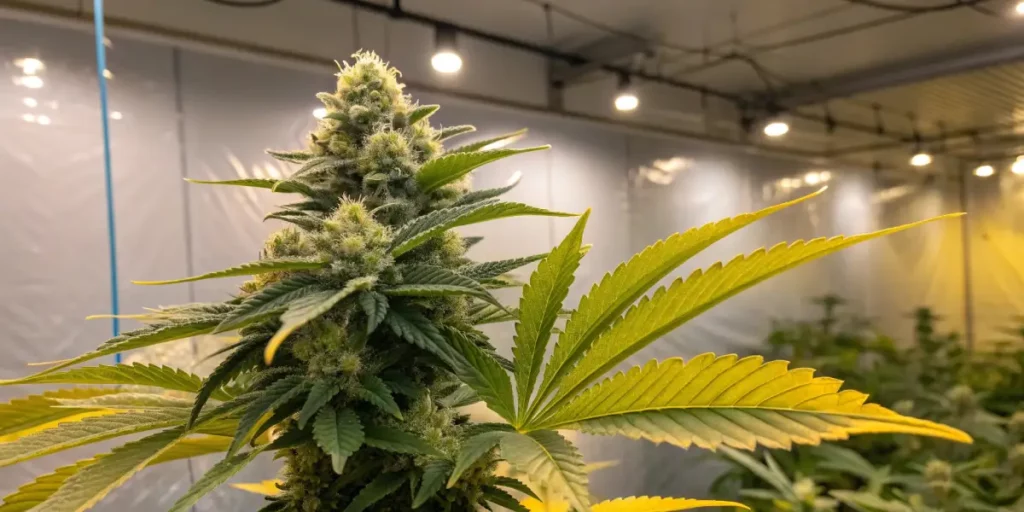
Propagation and Germination of Lemon Skunk Autoflower
Germinating Lemon Skunk Autoflower seeds successfully is the foundation of a productive grow. Start by selecting high-quality seeds from a trusted seed bank like Blimburn Seeds. This ensures that the seeds are genetically stable and capable of producing healthy plants.
The germination process for Lemon Skunk Auto can begin by soaking the seeds in water for 24-48 hours or using the paper towel method. Make sure to place them in a warm, dark area with a temperature of around 75-80°F (24-27°C). After the seeds have sprouted, carefully transfer them into a light and well-draining growing medium, like a seedling tray or small pots.
Once the seedlings have developed their first true leaves, they are ready to be transplanted into larger containers or directly into the ground. Keeping a humidity level of 60-70% during the early stages of growth will help the seedlings thrive. Remember to gradually increase the light intensity as the plants grow, to prevent stress and encourage healthy development.
Vegetative Phase
The vegetative phase is where Lemon Skunk Auto builds the foundation for its flowering stage. Although this phase is shorter than in photoperiod plants, it’s still critical to focus on plant health. During this time, the plants will grow rapidly, so they need proper lighting, nutrition, and care.
Indoor growers should continue providing 18-20 hours of light per day during the vegetative phase. Using LED lights with full-spectrum capabilities will ensure that the plants get the necessary light they need. Additionally, using fans to promote airflow is important to avoid heat buildup and to prevent potential mold issues.
Flowering Phase of Lemon Skunk Autoflower
Once Lemon Skunk Auto enters the flowering stage, the plant begins to develop its characteristic lemon-scented buds. The flowering period for this strain is approximately 8-10 weeks, after which the plants will be ready for harvest. During this time, switch the light schedule to 12 hours of light and 12 hours of darkness if growing indoors.
The Auto Lemon Skunk strain’s sativa-dominant genetics mean the plants can stretch significantly during the flowering phase, so be prepared to support the branches. Its buds will become dense and coated in trichomes, making them heavy and prone to bending. To maintain the plant’s structure as it grows, use trellises or stakes for optimal support.
Cannabis Fertilization and Nutrition
Proper nutrition is essential for maximizing yields and ensuring the health of Lemon Skunk Autoflower. Autoflowers generally require fewer nutrients than photoperiod strains, but providing the right balance at each stage of growth is crucial.
During the vegetative stage, focus on providing a nitrogen-rich fertilizer to promote healthy leaf and stem development. Once the plants transition into the flowering phase, switch to a bloom-specific nutrient formula that contains higher levels of phosphorus and potassium.
Additionally, adding beneficial microbes to the soil can help enhance nutrient absorption and boost overall plant health. Flushing the plants with plain water two weeks before harvest will help remove excess nutrients, ensuring that the final buds taste clean and smooth.
Pest and Disease Control for Lemon Skunk Autoflower
Although Lemon Skunk Autoflower is relatively resilient, it is still important to implement pest and disease prevention measures. Common pests that affect cannabis plants include spider mites, aphids, and fungus gnats. Regularly inspecting your plants and maintaining a clean grow space will help prevent infestations.
In the event of a pest outbreak, use organic pesticides or neem oil to control the situation. Be mindful of not using harsh chemicals that could affect the quality of your buds. Additionally, maintaining proper airflow and avoiding overwatering will reduce the risk of mold or mildew, which can damage your plants during the flowering stage.
Harvesting and Curing for Cannabis Growing
The best time to harvest Lemon Skunk strain is when the trichomes on the buds have turned milky white with some amber hues. This indicates that the THC levels are at their peak. Use a magnifying glass to closely inspect the trichomes and determine the ideal harvest window.
Once ready, carefully trim the branches and hang them upside down in a well-ventilated area to dry. The drying process should take between 7-14 days, depending on environmental conditions. Ensure the temperature is around 60-70°F (15-21°C) with a humidity level of 50-60%.
After drying, the buds should be placed in airtight containers for curing. Open the containers daily during the first week to release excess moisture, gradually reducing the frequency over time. Proper curing enhances the flavor and potency of the final product, so take your time to ensure the best possible results.
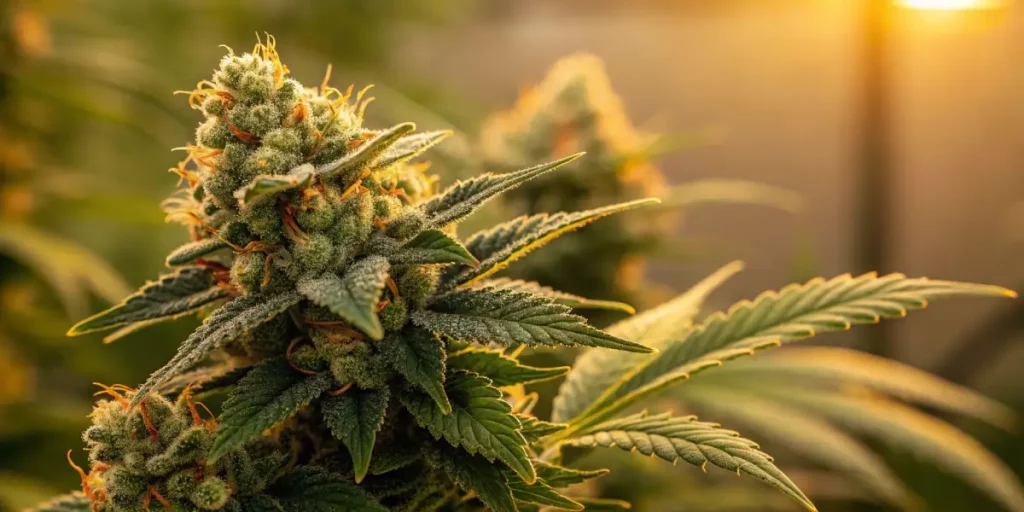
Is Lemon Skunk Autoflower Indica or Sativa?
Lemon Skunk Autoflower is a mostly sativa strain, offering uplifting and energizing effects that are characteristic of sativa genetics. However, its ruderalis background contributes to its autoflowering traits, making it easy to grow without the need for light cycle adjustments.
The sativa dominance in Lemon Skunk Auto ensures that users experience a creative and energetic high, perfect for daytime use. This strain is also known for its cerebral effects, making it a great choice for those who need a mental boost while still enjoying the benefits of relaxation. Overall, Lemon Skunk Auto provides a balanced experience, catering to both recreational and medicinal cannabis users.
Advantages of Growing Lemon Skunk Autoflower
Growing Lemon Skunk Autoflower comes with a host of benefits that make it an excellent choice for cultivators of all experience levels:
- Easy to Grow: Lemon Skunk Auto is beginner-friendly, thanks to its autoflowering traits. It requires minimal maintenance and can thrive in various conditions.
- Short Flowering Time: With a flowering period of just 8-10 weeks, you can enjoy a quick harvest, which is perfect for growers looking to cycle multiple crops in a season.
- Compact Size: The plant’s relatively small size (up to 4.92 ft) makes it suitable for indoor cultivation where space may be limited.
- Resilient Genetics: Lemon Skunk Auto is resistant to many pests and diseases, making it easier to manage without the need for heavy pesticide use.
- High Potency: With THC levels reaching up to 24%, Lemon Skunk Auto delivers strong effects that can be enjoyed by recreational and medicinal users alike.
Disadvantages
- Moderate Yields: While Lemon Skunk Auto is easy to grow, its yields are moderate compared to some larger, photoperiod strains.
- Light Sensitivity: Although autoflowers are not dependent on light cycles, they still require sufficient light exposure to maximize their potential.
- Less Control Over Growth Stages: Due to its autoflowering nature, growers have less control over the timing of the vegetative and flowering stages compared to photoperiod plants.
Why Buy Lemon Skunk Autoflower
Lemon Skunk Autoflower offers a unique combination of citrus flavors, energizing effects, and ease of cultivation, making it a popular choice for growers and users alike. Its fast flowering time and beginner-friendly nature make it ideal for those looking to cultivate cannabis marijuana quickly and with minimal effort. Whether you’re growing indoors or outdoors, Lemon Skunk Auto delivers consistent results with potent, flavorful buds.
This strain is also versatile, serving both recreational and medicinal purposes. The high THC content makes it effective for managing pain, while its uplifting effects can combat fatigue and boost creativity. Additionally, its strong lemon aroma and flavor make it a pleasure to consume, whether you prefer smoking or vaping.
When purchasing Lemon Skunk Autoflower seeds, it’s important to buy from reputable seed banks like Blimburn Seeds to ensure you’re getting high-quality genetics. This guarantees that your plants will have the desired traits and be free from genetic instability.
Problems in Cultivating Lemon Skunk Autoflower
While Lemon Skunk Autoflower is relatively easy to grow, there are a few challenges that cultivators may face:
1. Nutrient Management: Autoflowers, including Lemon Skunk Auto, can be sensitive to overfeeding. It’s essential to start with lower nutrient concentrations and adjust as needed based on the plant’s response.
2. Watering: Overwatering can be a common issue for beginners. Allow the soil to dry slightly between watering to prevent root rot, a common problem when growing autoflowers.
3. Space Constraints: Although Lemon Skunk Auto is compact, the plants can still stretch during the flowering stage. Make sure your growing space can accommodate this increase in size, especially if you’re growing indoors.
4. Lighting: While Lemon Skunk Auto is less dependent on light cycles, providing sufficient light throughout its growth stages is crucial. Inadequate lighting can lead to smaller yields and less potent buds.
Similar Strains to Lemon Skunk Autoflower
- Super Lemon Haze: Another sativa-dominant strain with intense citrus flavors and a similar uplifting effect. Super Lemon Haze is known for its high THC levels and energetic high.
- Lemon OG: A hybrid strain that shares the lemony goodness of Lemon Skunk Auto but offers a more balanced indica and sativa mix, making it a good choice for both relaxation and creativity.
- Sour Diesel Auto: This strain offers a similar autoflowering feature with energizing and cerebral effects, making it a great option for daytime use and creative activities.
Tips for Professional Growers
For those looking to cultivate Lemon Skunk Autoflower at a professional level, there are several strategies to maximize your yields and potency:
- Monitor Light Exposure: While autoflowers aren’t dependent on strict light cycles, providing at least 18 hours of light per day during the vegetative and flowering stages will ensure the best growth. High-quality LED lights can help maintain optimal light conditions.
- Optimize Nutrients: Autoflowers have different nutrient needs compared to photoperiod plants. Start with lower nutrient concentrations and slowly increase as the plant shows signs of development. Use a bloom-specific nutrient blend during the flowering phase to enhance bud production.
- Use Training Techniques: Low-Stress Training (LST) is particularly effective for Lemon Skunk Auto. This method involves gently bending and tying down the branches to create a more even canopy, ensuring all parts of the plant get sufficient light.
- Ensure Proper Ventilation: For indoor grows, keeping the air fresh is key to avoiding mold, mildew, and other pests. Regularly clean the grow space and use fans to maintain consistent airflow throughout the room or tent.
- Harvest Timing: Use a magnifying glass to inspect trichome development and ensure you harvest at the optimal time. A good rule of thumb is to wait until the majority of trichomes turn cloudy, with a few turning amber for a more balanced effect.
FAQs About Lemon Skunk Autoflower
How long does Lemon Skunk Autoflower take to grow?
Lemon Skunk Autoflower typically takes 8 to 10 weeks from seed to harvest, making it a fast-growing option for those looking for quick results.
Is Lemon Skunk Autoflower suitable for beginners?
Yes, Lemon Skunk Autoflower is beginner-friendly. Its resilience, short flowering time, and ease of cultivation make it a great choice for novice growers.
What is the THC content of Lemon Skunk Autoflower?
The THC content of Lemon Skunk Autoflower ranges from 18% to 24%, delivering strong psychoactive effects suitable for both recreational and medicinal users.
Does Lemon Skunk Autoflower have medical benefits?
Yes, Lemon Skunk Autoflower is known to help with conditions like arthritis, insomnia, and pain, thanks to its sativa-dominant effects that combine mental clarity with body relaxation.
What are the flavor and aroma profiles of Lemon Skunk Autoflower?
Lemon Skunk Auto offers a refreshing citrus and lemon aroma with earthy undertones, making it a popular choice for those who enjoy fruity strains.


